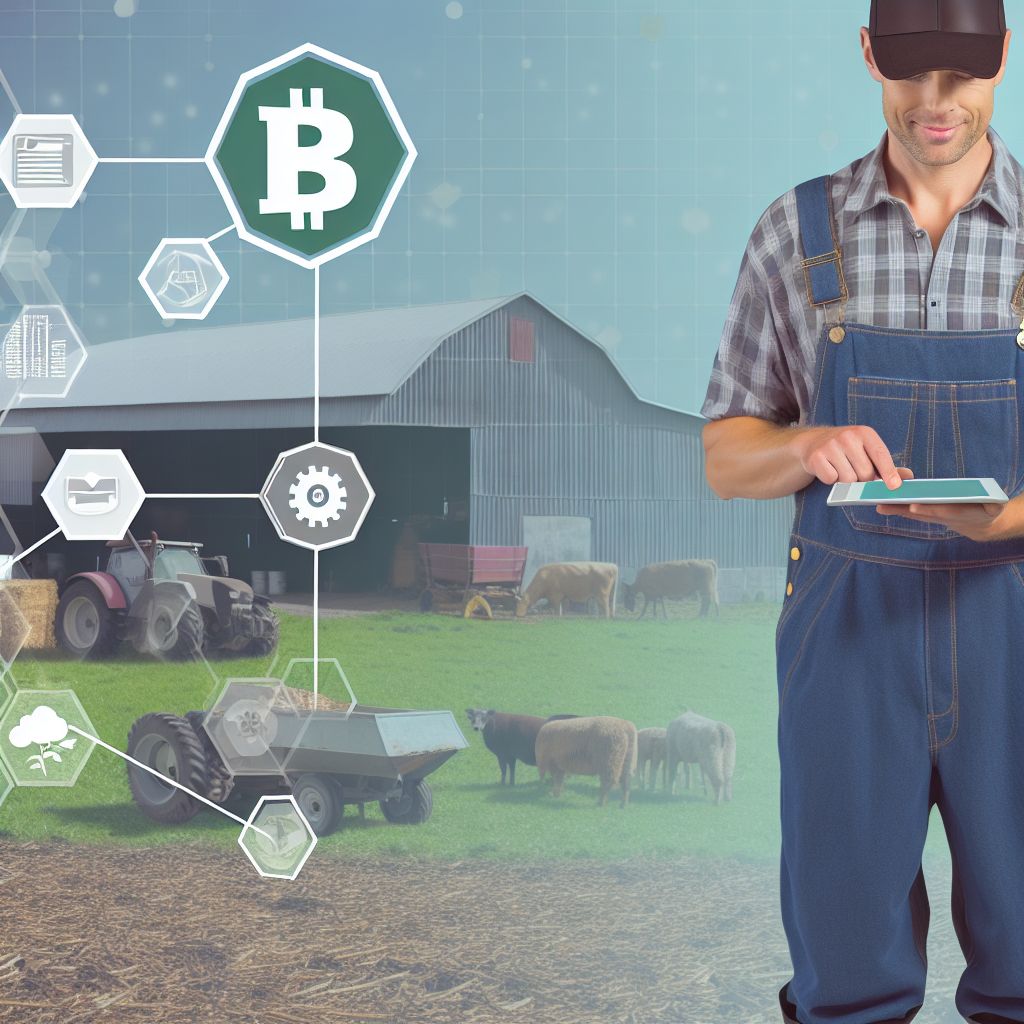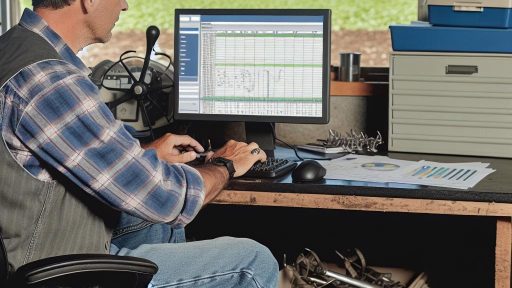Introduction to Blockchain Technology in Agriculture
Blockchain technology offers transparency and security to agricultural supply chains.
It ensures traceability from farm to table, enhancing consumer trust.
This technology enables stakeholders to verify the origin of agricultural products.
Moreover, blockchain reduces fraud in the supply chain.
It promotes ethical sourcing by documenting every transaction on a digital ledger.
Understanding the Basics of Blockchain
At its core, blockchain is a decentralized digital ledger.
This ledger records transactions across multiple computers securely.
Each block in the chain contains a set of transactions.
Once recorded, the information is immutable and transparent.
This feature fosters accountability among supply chain participants.
Blockchain’s Role in Ethical Sourcing
Ethical sourcing implies responsible extraction and procurement of resources.
Blockchain provides an auditable history of every product’s journey.
It helps brands demonstrate their commitment to ethical practices.
Consumers can access verified data on product origins and practices.
This transparency can lead to more sustainable purchasing decisions.
Transform Your Agribusiness
Unlock your farm's potential with expert advice tailored to your needs. Get actionable steps that drive real results.
Get StartedPotential Benefits for Farmers and Consumers
Farmers benefit from direct access to market insights and consumer data.
They can receive fair payments promptly through smart contracts.
Consumers gain confidence in the quality and origins of their purchases.
This confidence can drive higher demand for ethically sourced products.
Ultimately, blockchain technology can lead to a more sustainable agricultural ecosystem.
Overview of Ethical Sourcing in Agricultural Supply Chains
Definition of Ethical Sourcing
Ethical sourcing involves procuring products in a way that respects human rights and the environment.
This concept applies to the agricultural sector, where practices can greatly affect communities and ecosystems.
By focusing on ethical sourcing, businesses aim to build transparent and responsible supply chains.
Importance of Ethical Sourcing
Ethical sourcing fosters trust between consumers and producers.
It enhances brand reputation by demonstrating corporate responsibility.
Moreover, consumers increasingly demand transparency regarding product origins.
As awareness grows, businesses must adapt to these rising expectations.
Challenges in Agricultural Supply Chains
Many agricultural supply chains face significant ethical challenges.
Common issues include labor exploitation and environmental degradation.
In addition, the complexity of these supply chains makes monitoring difficult.
Companies often struggle to trace their products back to ethical sources.
Role of Technology in Ethical Sourcing
Technology plays a crucial role in enhancing ethical sourcing efforts.
Blockchain technology offers a promising solution for transparency.
This decentralized ledger system allows for real-time tracking of product origins.
Consequently, it helps identify potential ethical breaches early on.
Benefits of Implementing Ethical Sourcing
Implementing ethical sourcing practices offers multiple benefits.
- It improves stakeholder trust and loyalty.
- Responsible practices lead to better environmental outcomes.
- Organizations can reduce the risk of reputational damage.
- Ultimately, it contributes to sustainable agriculture.
Ethical sourcing is not just a trend but a fundamental shift in how businesses operate.
By focusing on these practices, companies can create a positive impact on society.
Key Challenges in Traditional Agricultural Supply Chains
Lack of Transparency
Traditional agricultural supply chains often lack transparency.
Showcase Your Farming Business
Publish your professional farming services profile on our blog for a one-time fee of $200 and reach a dedicated audience of farmers and agribusiness owners.
Publish Your ProfileThis obscurity can lead to unethical practices.
Consumers remain unaware of product origins.
Additionally, farmers struggle to access accurate market information.
Data Fragmentation
Information fragmentation is a significant issue.
Different stakeholders use disparate systems.
Such fragmentation complicates communication and data sharing.
Furthermore, it hinders collaboration along the supply chain.
Traceability Issues
Traceability remains a significant challenge in agriculture.
Many products cannot be traced back to their origin.
This lack of traceability raises concerns over food safety.
Moreover, it complicates compliance with regulations.
Trust Deficits among Stakeholders
Trust deficits exist among various supply chain players.
Farmers, distributors, and consumers often distrust each other.
This mistrust can discourage fair trade practices.
Additionally, it affects supply chain resiliency.
Environmental and Social Concerns
Environmental degradation poses threats to agriculture.
Unsustainable practices harm ecosystems and biodiversity.
Simultaneously, social concerns such as labor rights emerge.
Unethical labor practices are prevalent in many regions.
Market Fluctuations
Market fluctuations create instability for farmers.
Price volatility challenges their economic viability.
This uncertainty can discourage investment and innovation.
Many farmers struggle to secure fair prices for their produce.
Find Out More: Machine Learning Applications In Farming
How Blockchain Can Enhance Transparency in Sourcing Practices
Defining Transparency in Agricultural Supply Chains
Transparency involves clear visibility of sourcing practices in agriculture.
It ensures that consumers understand where food products originate.
Furthermore, transparency builds trust among stakeholders in the supply chain.
The Role of Blockchain Technology
Blockchain is a decentralized technology that records transactions securely.
This technology enables traceability of products from farm to table.
Additionally, blockchain provides an immutable ledger that records sourcing data.
Improving Traceability
Traceability is essential for verifying the origins of agricultural products.
Blockchain allows each transaction to be tracked and verified easily.
As a result, consumers can trace their food back to its source.
This capability enhances accountability among producers and suppliers.
Building Trust Among Consumers
Consumers demand more information about their food sources today.
Blockchain offers a transparent system that reassures consumers about quality.
This technology can effectively prevent food fraud and mislabeling.
In turn, consumers gain confidence in the products they purchase.
Facilitating Compliance with Standards
Many agricultural products must meet stringent quality and safety standards.
Blockchain can streamline the process of verifying compliance with regulations.
Showcase Your Farming Business
Publish your professional farming services profile on our blog for a one-time fee of $200 and reach a dedicated audience of farmers and agribusiness owners.
Publish Your ProfileWith its detailed records, blockchain simplifies audits for compliance certification.
This efficiency reduces costs and time associated with compliance verification.
Encouraging Ethical Sourcing Practices
Ethical sourcing ensures that agricultural products are produced responsibly.
Blockchain promotes ethical practices by making supply chains transparent.
It enables stakeholders to verify ethical standards are upheld throughout the process.
Consequently, suppliers are encouraged to adopt better practices.
Next Steps for Blockchain in Agriculture
Incorporating blockchain technology can significantly enhance transparency.
This innovation supports ethical sourcing in agricultural supply chains.
As the industry evolves, blockchain will play a crucial role in agriculture.
Delve into the Subject: Integrating Automated Machinery Into Traditional Farming
Case Studies of Successful Blockchain Implementation in Agriculture
Supply Chain Transparency: The Case of Walmart
Walmart utilizes blockchain technology for enhanced supply chain transparency.
This approach allows them to trace the origin of produce quickly.
For example, Walmart can track mangoes from farm to store in seconds.
Customers benefit from knowing where their food comes from.
Moreover, this boosts consumer confidence and trust in the brand.
Fair Trade Practices: Cocoa Supply Chains
The cocoa industry faces significant issues regarding fair trade practices.
Companies like Barry Callebaut have adopted blockchain to tackle these problems.
Using their blockchain platform, they ensure fair wages for farmers.
They also promote sustainable farming practices through traceability.
This fosters accountability and supports local farming communities.
Improving Quality Control: IBM Food Trust
IBM Food Trust demonstrates how blockchain can improve food quality control.
Collaborating with major food suppliers, they track products from source to shelf.
Real-time data assures consumers of the quality and safety of their food.
If issues arise, the system identifies the specific source swiftly.
This rapid response minimizes the impact of food safety incidents.
Empowering Farmers: Provenance Initiatives
Provenance empowers smallholder farmers through blockchain technology.
This platform connects farmers directly to consumers via a transparent supply chain.
Farmers can showcase their sustainable practices and products online.
Consequently, they receive better prices for their goods.
This model transforms their economic opportunities and strengthens communities.
Enhancing Sustainability: AgriDigital
AgriDigital improves supply chain efficiency through blockchain-based platforms.
They assist farmers with managing grain transactions securely.
This technology streamlines processes and reduces waste in the supply chain.
Farmers can track grain from harvest to payment effortlessly.
Ultimately, this approach enhances sustainability and profitability.
Discover More: Benefits of Controlled Environment Agriculture for Sustainable Farming

The Role of Smart Contracts in Ensuring Fair Trade and Ethical Sourcing
Introduction to Smart Contracts
Smart contracts revolutionize the agricultural supply chains.
They automate agreements based on predefined conditions.
This technology increases trust among parties involved.
Ensuring Fair Trade Practices
Smart contracts enforce fair trade practices effectively.
Showcase Your Farming Business
Publish your professional farming services profile on our blog for a one-time fee of $200 and reach a dedicated audience of farmers and agribusiness owners.
Publish Your ProfileThey ensure that all parties meet their obligations.
These contracts automatically release payments when conditions are fulfilled.
As a result, farmers receive timely payments for their products.
Promoting Ethical Sourcing
Smart contracts enhance ingredient traceability in the supply chain.
They allow consumers to verify the sources of their food.
This transparency fosters ethical sourcing practices.
Furthermore, consumers can support sustainably sourced products.
Reducing Fraud and Misrepresentation
Smart contracts reduce fraud risks in agricultural transactions.
They require transparent record-keeping on the blockchain.
Thus, stakeholders can easily access verified information.
This verification prevents misrepresentation of product origins.
Enhancing Collaboration Among Stakeholders
Smart contracts facilitate collaboration among various stakeholders.
Producers, distributors, and retailers can communicate effectively.
This coordinated effort helps streamline the supply chain.
As a result, ethical practices become the standard.
Case Studies and Success Stories
Various organizations employ smart contracts for ethical sourcing.
Agri-Tech Solutions has successfully implemented this technology.
The company reported increased farmer transparency and income.
Additionally, EcoAgriculture has improved engagement with consumers.
Future Potential of Smart Contracts
The application of smart contracts continues to grow in agriculture.
Future advancements may include more intuitive platforms.
These innovations can enhance usability for all stakeholders.
As technology advances, so will the potential for ethical sourcing.
Gain More Insights: AI-Driven Crop Monitoring Techniques
Impact of Blockchain on Consumer Trust and Brand Loyalty in Agriculture
Enhancing Transparency in Agricultural Supply Chains
Blockchain technology significantly enhances transparency in agricultural supply chains.
It provides consumers with real-time access to product origins.
Additionally, it allows tracking of every step in the supply chain.
This transparency builds trust between producers and consumers.
When consumers can see where their food comes from, their confidence increases.
Improving Traceability of Agricultural Products
Traceability is crucial in the agriculture sector.
Blockchain enables precise tracking of agricultural products from farm to table.
This traceability helps in identifying issues quickly, such as contamination.
Moreover, it ensures that ethical sourcing protocols are followed.
As a result, consumers feel more secure about their food choices.
Building Stronger Brand Loyalty
Brands that utilize blockchain can foster deeper loyalty among consumers.
Transparency and traceability enhance brand credibility.
Consumers appreciate brands committed to ethical practices.
Additionally, brands that can prove sustainability efforts often stand out.
This differentiation can lead to stronger customer retention and loyalty.
Empowering Ethical Consumer Choices
Blockchain empowers consumers to make informed decisions.
Showcase Your Farming Business
Publish your professional farming services profile on our blog for a one-time fee of $200 and reach a dedicated audience of farmers and agribusiness owners.
Publish Your ProfileWith clear product histories available, consumers can choose based on values.
Many shoppers today prioritize ethical sourcing and environmental sustainability.
Using blockchain, brands can showcase their commitment to these values.
This ability to align with consumer ethics enhances market competitiveness.
Challenges and Considerations
While blockchain offers numerous benefits, challenges exist.
Integration into existing supply chains can be complex and costly.
Moreover, education on blockchain technology is necessary for stakeholders.
Ensuring participation from all supply chain partners is also essential.
With proper management, these challenges can be addressed effectively.
Future Trends and Potential Developments in Blockchain for Agricultural Supply Chains
Enhanced Traceability
Blockchain technology greatly enhances traceability in agricultural supply chains.
This improvement provides clear visibility from farm to consumer.
Real-time tracking helps identify the origin of food products.
Moreover, it enables quick responses to food safety issues.
Companies like GreenEarth are already implementing these systems.
Smart Contracts
Smart contracts automate agreements within supply chains.
They reduce the need for intermediaries and manual processes.
This efficiency minimizes costs and improves transaction speed.
Furthermore, these contracts enhance trust among stakeholders.
As a result, farmers receive timely payments for their produce.
Collaborative Data Sharing
Blockchain fosters secure and collaborative data sharing.
Different stakeholders can access verified information easily.
This sharing reduces fraud and increases accountability.
Additionally, it allows farmers to make informed decisions.
Companies such as AgriChain are paving the way in this area.
Environmental Sustainability
Blockchain promotes environmental sustainability in agriculture.
It allows consumers to verify environmentally friendly practices.
Farmers can prove their compliance with sustainable standards.
This transparency encourages more eco-conscious purchasing decisions.
In turn, it supports agricultural practices that protect the planet.
Integration with IoT and AI Technologies
Integrating blockchain with IoT enhances data collection.
Farmers can monitor crops and soil conditions in real-time.
AI analysis can predict trends and optimize yields effectively.
This combination leads to increased productivity and efficiency.
As these technologies evolve, they will revolutionize agriculture.
Regulatory Compliance and Transparency
Blockchain assists with regulatory compliance in agriculture.
It provides a transparent record of farming practices.
Regulators can access necessary data quickly and efficiently.
Ultimately, this leads to better accountability across industries.
Consequently, consumer confidence in food safety increases.
Additional Resources
C.A.F.E. Practices: Starbucks Approach to Ethically Sourcing Coffee …
Showcase Your Farming Business
Publish your professional farming services profile on our blog for a one-time fee of $200 and reach a dedicated audience of farmers and agribusiness owners.
Publish Your ProfileImpact of Blockchain Technology on Supply Chain Transparency in …




